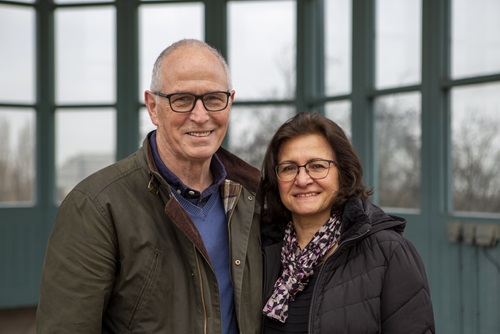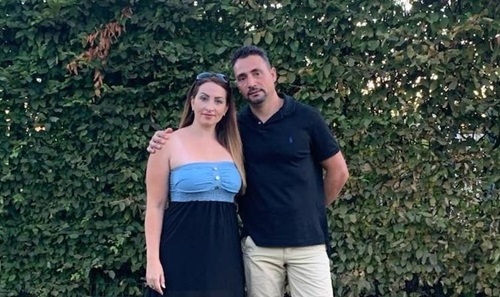Our foster carers
Meet Georgina Frimpong
Lewisham Foster Carer celebrates 35 years of service
We spoke to Lewisham Foster Carer, Susan Cook, about her experiences of fostering for nearly four decades.
Lewisham Council celebrated the life-changing love, security and dedication provided by foster carers across the borough at their annual Foster Carer Awards ceremony.
Eighteen foster carers received awards for their excellence in caring for children and young people from the borough. Another 22 carers received the Long Service Award, with awards for five, 10, 15, 20, 25, and even 35 years of service.
Amongst the recipients was Susan Cook, who was presented a Lifetime Achievement Award for fostering with Lewisham for 35 years.
Susan started as a respite carer, temporarily looking after children for short periods of time. In 1993, Susan – a single mother - made the decision to move to fostering full-time as it allowed her to be at home with her son and also earn money. Having worked at a Lewisham nursery for 16 years, fostering seemed like the perfect solution.
In her time as a foster carer, Susan has looked after more than 70 children – many of whom now visit her as adults. Susan reflected on the experience of her foster children returning to her as adults saying, “when the children you once fostered return to you as adults, they are always very thankful for the work you put in for them. When they are younger they can’t always recognise how much foster carers do for them, but when they get a bit older and have gained some perspective they can see that we did so much to shape their lives”. Now more than ever children and young people need dedicated and compassionate foster carers like Susan, who can welcome them into their hearts and homes.
“As a foster carer”, says Susan, “you are making a family and trying to make a different life for a child. That’s how it was 35 years ago and that’s how it is now. All kids need to be treated like individuals and there is no typical foster placement. It is hard work and not lovey-dovey all the time, but there are real rewards”.
Lewisham Council offers all foster carers competitive allowances, support and training. There are a range of different fostering options from short-term, emergency placements to long-term, permanent placements, and social workers speak with potential carers to see what works for their lives and families.
Most importantly, Lewisham foster carers are part of a community made up of truly passionate, caring and experienced social workers and carers who are making a real difference in their local community.
Meet the Stevens family
Meet Jon and Despo Stevens, who decided to start fostering when they saw a sibling group in need of a home.
Despo and Jon Stevens do not have an ordinary fostering story. They came into fostering by chance, but have never looked back since.
Despo became aware that the mother of a student at her school had suddenly passed away. She knew the child’s older siblings from an early age as their headteacher. She became increasingly involved in this student’s and their siblings’ lives when life became increasingly difficult for them.
Despo remembers the shock when one child asked for a bed for his birthday and she knew she had to do something. When their father became ill, the Stevens stepped in and took the children into their care. They were worried that if they did not take the children in, that the siblings would be split up in care.
“Despo had always joked about having six children when we married,” Jon reflects, “which I always thought was a joke. We have three birth children and we suddenly acquired three more, so our family doubled in size. It’s complete now”.
Jon was a retired headteacher when the children came into their care and Despo has since retired. “The goal was to retire and travel, but life intervened and our path changed,” says Jon.
Having worked with children the entirety of their careers, the Stevens didn’t feel phased working with children in their home. Soon they discovered that fostering was different and required a lot of time and patience to build relationships with the children in their care.
“The positive thing about being a foster carer is that you get all this support”, says Despo, “without support it would be difficult because the children in your home are traumatised.”
“I encourage anyone to consider becoming a foster carer,” Jon says.
“It’s so rewarding. The youngest would always come and hug and shout ‘I love you’ at the end of the day. Now, the oldest does as well,” Despo adds, smiling.

Meet the Nuray Family
As part of Refugee Week 2022, we meet the Nuray family, who have provided foster care for many unaccompanied asylum seeker children from all over the world.
Yeliz and Erkan are Lewisham foster carers who have cared for many young people, some from Lewisham and others who are unaccompanied asylum seekers from all over the world. “I knew I wanted a big family, but I didn’t expect that it would include young people from all over the world,” said Yeliz. Yeliz’s first experience fostering was as a respite carer for her parents. “It gave me a chance to build the confidence to take on fostering full-time,” Yeliz said, “being a respite carer I got to build relationships with young people and see how those relationships can help change these children”.
In 2015 Yeliz and Erkan had their first full-time placement. Yeliz’s first placements were Lewisham children, but she was soon placed with a young Afghan unaccompanied asylum seeker. “It was very different from the placements before. The language barrier was difficult, but he had been in a refugee camp in Turkey and we communicated through some Turkish and some English”. Yeliz has since had placements from all around the world including Vietnam, Sudan, and Albania.
“Fostering unaccompanied asylum seekers is very different from mainstream fostering. The language and cultural barrier is part of it, but I also had to learn how to navigate the immigration system and place them in ESOL classes. These young people have faced some sort of trauma coming into the country. Sometimes they are fleeing war and have not heard from family in years. I liaise with the Red Cross to see if we can find their family. Sometimes we hear back, but sometimes we don’t. It’s challenging, but I know that I need to be there to support these young people going through an extraordinarily difficult time”.
“Fostering unaccompanied asylum seekers means that my family is constantly interacting with different cultures. I like to call my house the International House. I try to strike a balance between keeping these young people in-touch with their native culture and helping them navigate a new one in London.
“I do this in part through food. I have learned how to make dishes from the places these young people are from. It’s my way of helping them remember their old home and welcoming them to their new home”.

Meet Cherrylen: Fostering as a single parent
Being single is not a barrier to becoming a foster carer. In fact, around half of Lewisham foster carers are single women. Cherrylen is a single foster carer in Lewisham. Read her advice for other single people who are considering fostering.
In the early 2000s, Cherrylen decided to leave a career in education to become a foster carer with Lewisham. “Fostering for me was a way to have more time for myself and be remunerated. As an educator, I had the experience with young people that would give me a good footing as a foster carer. Fostering gave me the opportunity to build on that skill set”.
After fostering for nearly two decades as a single carer, Cherrylen has plenty of advice for prospective single carers.
“I came into fostering having been a single mother to two of my biological children. I can tell you that fostering as a single carer is not the same as being a single parent. As a foster carer you are a professional carer. There are more expectations of you, but there is also more help. You are not the only one who plays the role of a carer to a young person. The fostering service does as well.
“You are not working in isolation. You are part of a community. You need to know where and who your resources are. Get support from the fostering service, other foster carers, and respite care.”
Cherrylen adds that the fostering service is not the only place signal carers can find support. “Consider who is in your own personal support network. Would your mother want to be a secondary carer? A friend? A neighbour? Approach these people and ask them if they would be willing to be a back-up carer”.
Cherrylen stresses that foster carers, particularly those who are single, need to work to capacity. “Know your routine and your boundaries. I speak with my social worker and am clear when I can and cannot take on more placements. I foster teenagers and I let them know my expectations too. Having open communication allows me to avoid burnout and build a connection with young people”.
Meet the Bennetts
Meet Errol and Carleen Bennett, who started fostering for Lewisham Council in 2011.
“We were introduced to fostering after speaking to a family member. It made us realise that fostering was a way we could help a child in our community. We always had family coming and going from our home, so stepping into fostering felt natural. At the time we lived in Lewisham and it made sense for us to foster with our local authority”, says Carleen.
At the time they started fostering, their two teenage children still lived at home. “Having other children in the house really helped our family connect with our foster child in another way. Being closer in age meant that they could build a special relationship and communicate on their level”, reflects Errol.
Reflecting on their first placement Carleen says, “I remember when we got the call and were told to come immediately to pick up a child. We jumped in the car and drove to Catford not sure what to expect. I remember picking the child up and seeing that he only had two plastic bags of clothes and I thought that this child doesn’t look like he belongs to anyone!”
“I remember that car ride home”, adds Errol, “he’d kept saying that he’d be moved on to another placement in no time. I just kept saying ‘we’ll see’. I knew he had moved around a lot, but we decided then and there that we would be his last foster family. I just kept thinking ‘if this was my child, what would I want for them’. I knew that I would want someone to be patient and do anything they could to make my child’s life better, so that’s what we decided to do for this child.”
“It was not always easy. It took a lot of patience and support from our social worker and other foster carers, but we started to see a change in his behaviour”, says Carleen. “Knowing that we were the difference in this young man’s life is so rewarding. Fostering is a special gift you can give to a child. I would encourage anyone wanting to help children in their community to consider fostering”.
